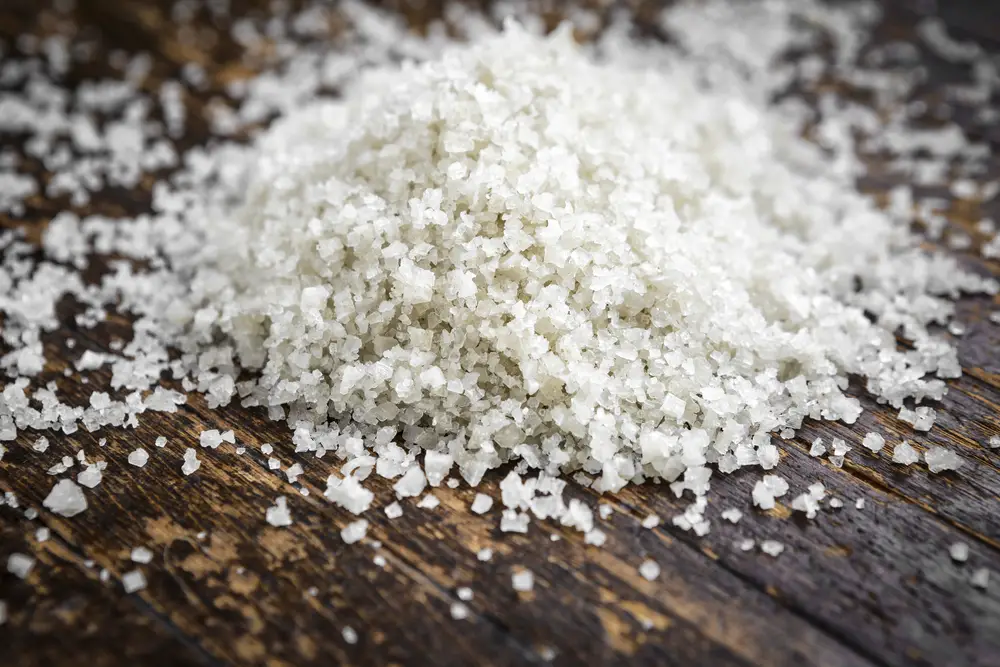Celtic salt is a type of sea salt that has been harvested from the coastal region of Brittany, France, for centuries. It is known for its unrefined, greyish appearance and unique mineral content.
Celtic salt is harvested using traditional wooden rakes and is minimally processed, making it a popular alternative to regular table salt.
One of the key benefits of Celtic salt is its mineral content. Unlike regular table salt, which is often heavily processed and stripped of its natural minerals, Celtic salt contains a variety of essential minerals such as magnesium, calcium, and potassium.
These minerals are important for maintaining healthy bodily functions, including nerve and muscle function, bone health, and fluid balance.
Another benefit of Celtic salt is its potential to improve respiratory health. Regular consumption of Celtic salt may help to reduce excess mucus and congestion in the nasal passages and lungs. This is due to the salt’s ability to balance out the minerals in the body, which can help to reduce inflammation and improve immune function.
Overall, Celtic salt is a natural and healthy alternative to regular table salt that offers a range of potential health benefits.
Understanding Celtic Salt
Celtic salt is a type of sea salt that is harvested from the coastal regions of France. It is known for its coarse texture and moist consistency, which makes it ideal for use in cooking and seasoning.
Celtic salt is also referred to as grey salt or light grey Celtic sea salt, depending on the colour of the crystals.
Unlike table salt, which is heavily processed and refined, Celtic salt is unrefined and contains a variety of minerals and trace elements that are beneficial to human health.
The salt is harvested using traditional methods, with salt farmers using wooden rakes to gather the salt from the seawater.
Celtic salt is available in both coarse and fine ground varieties, depending on the intended use. The coarse texture of the salt makes it ideal for use as a finishing salt, while the fine ground Celtic sea salt is better suited for use in cooking and baking.
One of the key benefits of Celtic salt is its high mineral content. The salt contains a variety of essential minerals, including sodium, magnesium, and potassium, which are important for maintaining a healthy body.
Celtic salt is also known for its anti-inflammatory properties, which can help to reduce inflammation in the body.
Overall, Celtic salt is a healthy and flavourful alternative to traditional table salt. Its unique texture and mineral content make it an excellent choice for use in a variety of dishes, from soups and stews to salads and roasted vegetables.
Historical Significance of Celtic Salt
Celtic sea salt holds a rich tapestry of historical significance, woven into the culinary and health practices of ancient civilisations. This section explores its role in both culinary traditions and ancient harvesting methods.
Culinary Traditions
Celtic sea salt, particularly known as sel gris in France, has been a cherished ingredient in European cooking for centuries.
Chefs favour its ability to enhance flavour profiles due to its mineral complexity, which differs from that of standard table salt. Its adoption into gourmet cuisine is a nod to its enduring legacy in culinary arts.
Ancient Practices
The methods of harvesting Celtic sea salt can be traced back to the Iron Age. Ancient communities near the Atlantic coast of Brittany perfected the craft, utilising the evaporation of seawater in clay pools to yield salt rich in minerals.
This practice not only perpetuated a sustainable approach to salt extraction but also formed the foundation of the economic and social structures of those communities.
10 Health Benefits of Celtic Salt
Celtic salt, also known as Celtic sea salt or grey salt, is a type of salt that is harvested from the seawater off the coast of Brittany, France. It is often considered a healthier alternative to table salt due to its unique mineral composition and less processing. While some health claims surrounding Celtic salt may be exaggerated, it does offer certain potential benefits. Here are 10 health benefits attributed to Celtic salt:
1. Rich in Minerals
Celtic salt contains various essential minerals such as magnesium, calcium, potassium, and trace minerals like zinc and selenium, which are important for overall health.
2. Balanced Electrolytes
It can help balance electrolyte levels in the body, which are crucial for maintaining proper muscle function, nerve transmission, and hydration.
3. Supports Hydration
Celtic salt may promote better hydration by helping the body retain water and preventing dehydration.
4. Improved Digestion
Some people find that using Celtic salt in moderation can aid in digestion by stimulating the production of digestive juices and enzymes.
5. Enhanced Flavor
Celtic salt has a unique flavor profile due to its mineral content, which can enhance the taste of dishes without the need for excessive salt.
6. Lower Sodium Content
It typically contains lower sodium levels compared to table salt, making it a better option for those watching their sodium intake.
7. Potential Blood Pressure Benefits
The lower sodium content and the presence of other minerals in Celtic salt may have a less significant impact on blood pressure compared to table salt.
8. Alkalizing Effect
Some proponents claim that Celtic salt can help maintain a more alkaline pH in the body, which may be beneficial for overall health.
9. Skin Health
Bathing in water with Celtic salt is believed to have skin-soothing and detoxifying effects, promoting soft and healthy skin.
10. Nutrient Absorption
Adequate mineral intake from Celtic salt may support better nutrient absorption in the digestive system.
It’s essential to use any type of salt, including Celtic salt, in moderation. Excessive salt intake can still lead to health problems like high blood pressure and cardiovascular issues. Additionally, individual responses to salt can vary, so it’s important to consult with a healthcare professional for personalized dietary recommendations.
Nutritional Profile of Celtic Salt
Celtic salt is a type of sea salt that is harvested from the coastal regions of France. It is known for its unique mineral content, which includes a range of essential and trace minerals that are important for maintaining good health.
One of the most significant nutritional benefits of Celtic salt is its high mineral content. It contains over 80 different minerals, including magnesium, calcium, potassium, iron, and zinc. These minerals are essential for a range of bodily functions, including nerve and muscle function, bone health, and immune function.
Celtic salt is also a rich source of sodium, which is an essential mineral needed by the body to control blood pressure and volume. Healthy adults should consume at least 2,300mg of sodium a day, whereas people with a history of heart disease should limit their sodium intake to 1,500mg.
In addition to its mineral content, Celtic salt is also a good source of iodine, which is important for thyroid function and the production of thyroid hormones. It also contains other trace minerals that are important for overall health, including selenium, copper, and manganese.
Overall, Celtic salt is a nutrient-dense food that can provide a range of health benefits. Its high mineral content makes it a great alternative to regular table salt, which is often highly processed and stripped of its natural mineral content.
By incorporating Celtic salt into your diet, you can ensure that you are getting the essential minerals your body needs to function optimally.
Health Benefits of Celtic Salt
Celtic salt is a type of sea salt that is harvested from the coastal regions of Brittany, France. It is known for its distinct flavour and unique mineral composition. Here are some of the health benefits of Celtic salt:
Electrolyte Balance
Celtic salt is rich in essential minerals such as sodium, potassium, magnesium, and calcium.
These minerals are important for maintaining the body’s electrolyte balance, which is essential for proper nerve and muscle function, maintaining healthy blood pressure levels, and regulating the body’s fluid balance.
Iodine Deficiency
Celtic salt is a natural source of iodine, which is essential for thyroid function. Iodine deficiency can lead to goiter, hypothyroidism, and other thyroid-related health problems.
Including Celtic salt in your diet can help prevent iodine deficiency and promote healthy thyroid function.
Hydration
Celtic salt helps the body to absorb and retain water, which is essential for proper hydration. It also helps to prevent dehydration by maintaining the body’s electrolyte balance.
Cardiovascular Health
Celtic salt contains minerals that are important for cardiovascular health, such as potassium and magnesium. These minerals help to regulate blood pressure and prevent hypertension, which is a major risk factor for heart disease.
Muscle Function
Celtic salt is important for proper muscle function, as it helps to maintain the body’s electrolyte balance. It can also help to prevent muscle cramps and other problems associated with electrolyte imbalance.
Brain Function
Celtic salt contains minerals that are important for brain function, such as magnesium. Magnesium is essential for nerve function and can help to improve brain function, promote restful sleep, and prevent irregular heartbeats.
Alkalizes the Body
Celtic salt is alkalizing to the body, which can help to maintain the body’s acid-alkaline balance. This is important for overall health, as an acidic environment in the body can lead to inflammation, infections, and other health problems.
Overall, Celtic salt can provide a range of health benefits when consumed in moderation as part of a balanced diet.
How to Use Celtic Salt in Cooking
Celtic salt is a popular ingredient in many kitchens due to its unique flavor and texture. It is a moist salt that has larger crystals than regular table salt, making it perfect for use as a finishing salt.
Its distinctive flavor is a result of the minerals it contains, which include magnesium, calcium, and potassium.
When cooking with Celtic salt, it is important to note that it is not as salty as regular table salt. This means that you may need to use more of it to achieve the desired level of saltiness in your dishes.
However, its larger crystals mean that it is less dense than regular salt, so you may end up using less of it overall.
Celtic salt is also great for baking, as it helps to retain moisture in baked goods. Its unique texture and flavor make it a great addition to bread, pastry, and cake recipes.
When using Celtic salt in baking, it is important to note that it may not dissolve as easily as regular salt. Therefore, it is best to dissolve it in a small amount of liquid before adding it to your recipe.
For those who enjoy using salt in their cooking, Celtic salt is a great option. Its unique flavor and texture make it a versatile ingredient that can be used in a variety of dishes.
Whether you are using it as a finishing salt or incorporating it into your baking, Celtic salt is sure to add a delicious twist to your recipes.
How is Celtic Salt Different to Other Salts
Celtic salt is a type of unrefined sea salt that is harvested along the coast of Brittany, France. It is known for its unique mineral composition and health benefits.
In this section, we will compare Celtic salt with other types of salt to understand its distinct characteristics.
Table Salt
Table salt is the most commonly used salt in households. It is heavily processed and refined, which removes most of its natural minerals and leaves only sodium chloride.
Table salt is usually iodized, which means that it is fortified with iodine to prevent iodine deficiency. However, excessive consumption of table salt can lead to health problems such as high blood pressure and heart disease.
Himalayan Salt
Himalayan salt is a type of rock salt that is mined from the Khewra Salt Mine in Pakistan. It is known for its distinctive pink color, which comes from the minerals present in the salt.
Like Celtic salt, Himalayan salt is unrefined and contains a variety of minerals. However, Himalayan salt has a higher sodium content than Celtic salt, which may be a concern for people who are trying to reduce their sodium intake.
Kosher Salt
Kosher salt is a type of coarse salt that is used in koshering meat. It is made solely from sodium chloride and does not contain any additives or iodine. Kosher salt has larger grains than table salt, which makes it easier to control the amount of salt being used in cooking.
Refined Salt
Refined salt is produced by removing impurities and minerals from natural salt. This process leaves only sodium chloride, which is then fortified with iodine. Refined salt is commonly used in processed foods and has been linked to health problems such as high blood pressure.
Fleur de Sel
Fleur de sel is a type of sea salt that is harvested by hand from the surface of salt ponds. It is known for its delicate flavor and texture. Fleur de sel is more expensive than other types of salt and is often used as a finishing salt.
In summary, Celtic salt is a type of unrefined sea salt that is rich in minerals and has numerous health benefits. Compared to other types of salt, Celtic salt has a unique mineral composition and is less processed. However, it is important to consume all types of salt in moderation to maintain a healthy diet.
Potential Risks and Considerations
While Celtic salt has numerous health benefits, there are also some potential risks and considerations to keep in mind. Here are some of the most important ones:
Lead Content
One of the main concerns with Celtic salt is that it may contain small amounts of lead. While the lead content is generally low, it is still a potential risk, especially for pregnant women and children.
It is recommended to purchase Celtic salt from a reputable source that tests for heavy metals and other contaminants.
Pure vs. Iodized Celtic Salt
Another consideration is that not all Celtic salt is created equal. While pure Celtic salt is unrefined and contains natural minerals, some brands may add iodine to their salt to prevent iodine deficiency. It is important to read the label carefully to ensure that you are getting the type of salt that you want.
Balance Blood Sugars
While Celtic salt may help balance blood sugars, people with diabetes should still monitor their salt intake and consult with their doctor before using Celtic salt as a treatment.
Metal Sensitivities
People with metal sensitivities should also be cautious when using Celtic salt, as it may contain trace amounts of metals like iron and zinc.
Drinking Water
Celtic salt is often used to add flavour to drinking water. However, it is important to note that drinking too much saltwater can be harmful to your health. The Mayo Clinic recommends that adults limit their daily sodium intake to no more than 2,300 milligrams per day.
Lifestyle Factors
It is also important to remember that no single food or supplement can replace a healthy lifestyle. The American Heart Association recommends a balanced diet that includes plenty of fruits, vegetables, whole grains, lean protein, and healthy fats.
Consultation with a Doctor
Finally, it is always a good idea to consult with a doctor or registered dietitian before making any major changes to your diet or supplement routine. They can help you determine whether Celtic salt is right for you and provide guidance on how to use it safely and effectively.
Celtic Salt in the Market
Celtic salt, also known as sel gris or grey salt, is a type of sea salt that is harvested from the coastal region of Brittany, France. It is becoming increasingly popular in the market due to its unique flavour and potential health benefits.
In America, Celtic salt is widely available in health food stores and online marketplaces such as Amazon. It is often sold in coarse or fine granules and packaged in a resealable bag or jar.
While it is more expensive than regular table salt, many people are willing to pay the premium price for its perceived health benefits.
Unlike regular table salt, Celtic salt does not contain any additives or anti-caking agents. It is also naturally rich in minerals such as magnesium, calcium, and potassium.
These minerals are important for maintaining healthy bodily functions such as nerve and muscle function, hydration, and bone health.
Celtic salt has a lower water content than regular table salt, which means that it has a stronger flavour. This makes it a popular choice among chefs and food enthusiasts who want to add a unique flavour to their dishes.
It can be used in a variety of recipes including soups, stews, marinades, and dressings.
In conclusion, Celtic salt is a unique and flavourful alternative to regular table salt that is becoming increasingly popular in the market. While it may have some potential health benefits, it is important to use it in moderation as part of a balanced diet.
Frequently Asked Questions
How much Celtic salt should be consumed daily?
Celtic sea salt is a natural and unrefined salt that contains trace minerals and electrolytes. However, it is important to consume it in moderation. The recommended daily intake of Celtic salt is around 1/4 to 1/2 teaspoon per day.
It is essential to remember that excessive consumption of any kind of salt can lead to health problems such as high blood pressure, so it is best to consult a doctor or nutritionist for personalized advice.
Are there any side effects of Celtic sea salt?
Celtic sea salt is generally considered safe for consumption. However, excessive intake of Celtic salt can lead to health problems such as high blood pressure, water retention, and kidney damage.
It is essential to consume it in moderation and consult a doctor or nutritionist for personalized advice.
What are the benefits of Celtic sea salt for skin?
Celtic sea salt has several benefits for the skin. It contains minerals such as magnesium, calcium, and potassium, which help to nourish and hydrate the skin.
Celtic salt can also help to exfoliate dead skin cells and unclog pores, leading to clearer and brighter skin. Additionally, it can help to balance the skin’s pH levels, reducing inflammation and irritation.
What is the recommended way to consume Celtic salt?
Celtic sea salt can be consumed in various ways. It can be added to food during cooking or sprinkled on top of dishes as a finishing salt. It can also be added to water or other beverages to replenish electrolytes.
Some people prefer to use Celtic salt in their skincare routine by adding it to bathwater or using it as a body scrub.
Is Celtic salt better than Himalayan salt?
Both Celtic salt and Himalayan salt are natural and unrefined salts that contain trace minerals and electrolytes. However, the mineral content and taste of the two salts differ.
Celtic salt is harvested from the Atlantic Ocean and has a slightly salty and mineral-rich taste, while Himalayan salt is harvested from the Himalayan mountains and has a milder taste.
Ultimately, the choice between the two salts depends on personal preference.
Is Celtic Sea Salt considered the healthiest salt?
Celtic sea salt is considered a healthier alternative to refined table salt due to its unrefined nature and mineral content. However, it is important to consume it in moderation and as part of a balanced diet.
Other natural salts such as Himalayan salt and Fleur de Sel also have their own health benefits and can be used as alternatives to refined salt.
My name is Ellis Francis and I have been a personal fitness trainer, sports nutritionalist and health and fitness advisor for over 25 years. I am the lead health and fitness advisor at https://awellnessbody.com.







